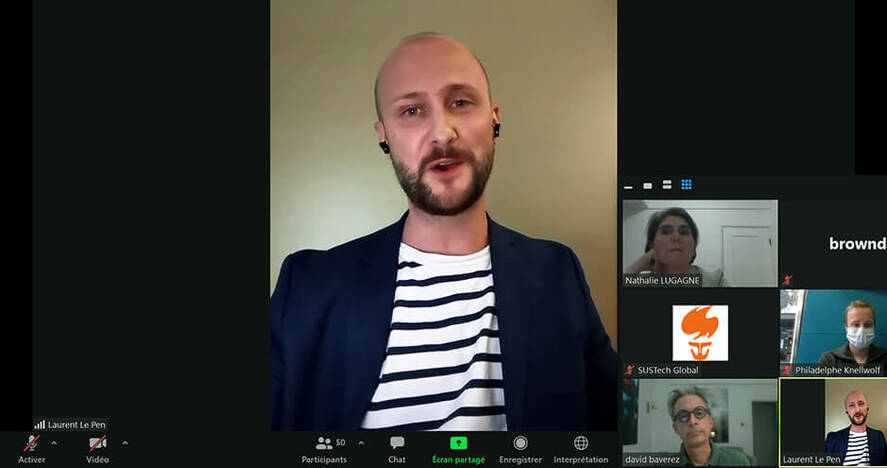Shenzhen: the New Eldorado for HEC Paris Startuppers?
Exactly 29 months after signing a partnership accord with SUSTech, HEC Paris co-organized a webinar entitled “Welcome to Shenzhen, where Miracles Happen”. Chaired by the school’s Hong Kong-based Associate Professor Nathalie Lugagne, it invited investor David Baverez (H88) and CEO Laurent Le Pen to share their experiences and provide advice to all students interested in investing in one of China’s most dynamic cities.

“You must train your brain to think the opposite of the European mindset if you decide to invest here,” advised David Baverez, who balances a career of self-styled “Business Angel/Demon” with being an essayist and author. “The wheels of history are changing and the West has to learn from China if it wants to stand a chance in the new global economy.” Baverez’ precise and hard-hitting vision is rooted in eight years of experience as a private investor in Hong Kong, much of which he has distilled into “Beijing Express” (Westphalia Press, 2018), his book on how to better understand the new China.
The HEC alumnus was one of two guest speakers at the inaugural Talk Series which HEC Paris and SUSTech organized on October 27 to launch a new France-China program. “This is a wonderful platform to boost our university's commitment to research, innovation and entrepreneurship,” said Dr. LI Xu, Acting Director of the Joint Institute of SUSTech-HEC Paris. Classed by the T.H.E. World University Rankings among the Top Ten universities in mainland China, the faculty helped to set up the SUSTech-HEC Paris Institute for Global Management and Entrepreneurship earlier this year. “We are delighted to co-organize this webinar,” said Inge Kerkloh-Devif, senior executive director of the HEC Paris IDEA Center. “Shenzhen provides an amazing region for entrepreneurial opportunities. This joint program provides concrete opportunities for students in both schools. It also builds mutual trust and confidence between our two nations.”
Forget Uber, Go for Blabla
Invited speaker Laurent Le Pen is the founder and CEO of Omate, a wearable tech platform. Working out of Shenzhen on-and-off for the past 13 years, he put his move from France down to opportunism and serendipity: “Shenzhen is a city of industrial designers, it’s no longer the factory of the world. It’s expanding rapidly, so I invite all prospective startups to try to find local, trustworthy partners here to build their businesses. You should have startups that are either very innovative in a highly competitive market. Or one for the niche market – and, please, fight the clichés: the Chinese are NOT averse to coffee or good cheese!”
Both speakers insisted on the tremendous opportunities China is currently affording the business world. “Don’t come here with a Uber attitude, come with a Blablacar vision: that’s to say, a shared and inclusive economy,” said David Baverez. “What we discover here is that the B2B approach is founded around the concept of connectivity. This industrial hub best understands that GDP growth is through incremental connectivity. Connectivity through better transport between cities; better connectivity within cities; and better connectivity between individuals and their connected devices.”
Money for Value
HEC’s former Associate Dean for Executive Education, Nathalie Lugagne, pointed out the quantum leap Shenzhen has enjoyed in the past decade: “This used to be a small fishing village! It’s now competing with the likes of Tokyo and maybe, soon, even the Silicon Valley. A decade ago, its growth was 0.1% that of Hong Kong, now it’s overtaken its huge neighbor. And the research and innovation coming out of our partnership with SUSTech proves Shenzhen is continuing to grow in strength.”
For Baverez, the mindset is equally philosophical: “French business needs to understand that it’s not value for money here, it’s money for value. That means customer satisfaction is key, and so are local outlets feeding into this satisfaction.” The private investor also insisted that China is dematerializing production and going towards a cashless society. “And, finally, there’s the question of points of sale: in China, they de-segregate, merging retail and the media. So, shops don’t sell goods, they promote them.”
Divergent Appointment Cultures
To illustrate the importance of social media, Laurent Le Pen points to the use of Wechat in Chinese business circles: “All the important transactions are done through this platform. Contrary to what is thought in France, it’s a very professional, efficient tool: to communicate, to pay, to share documents…” “And to make appointments!” adds Baverez. “In France, you must wait two months for an appointment, something seen as impolite and unprofessional in China. I arrange appointments on the day here.” The conclusion from both seasoned business professionals? To “leave your French business culture behind when you embrace China and its flexibility!”
The next SUSTech-HEC Paris session is on November 18.
Read also :

